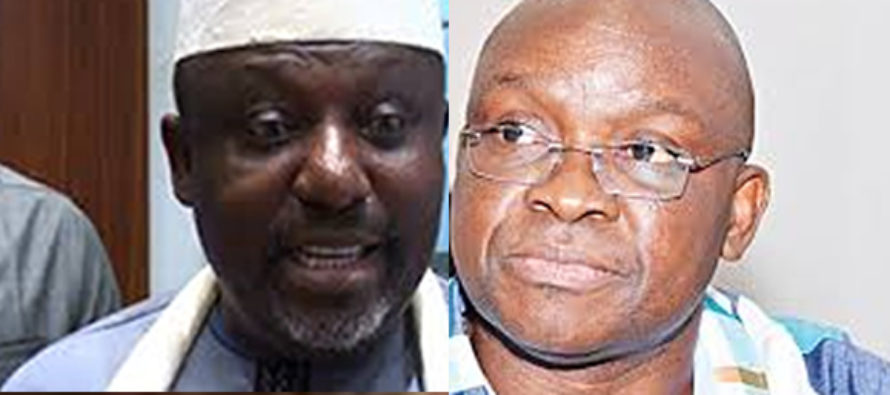
Following a rumoured arrest of former governor of Imo State, Rochas Okorocha by operatives of Economic Financial Crime Commission (EFCC) on Thursday, the immediate former governor of Ekiti State, Ayodele Fayose has said he is welcome to club of EFCC arrestees.
Fayose who was arrested by the anti-graft commission after his exit from office stated this on his twitter account that he expect Okorocha to be arrested.
He said: “Just reading that Okorocha was arrested by EFCC. True or not, we knew this day will come. However, I welcome him to the EFCC Alumni & enjoin the commission not to look away from Amosun too. While I encourage them to surrender themselves as I did,I welcome Mr Okorocha to the club“, he said on twitter.

Meanwhile, EFCC has denied unconfirmed reports circulating in the media which claimed that the anti-graft agency arrested Rochas Okorocha on Thursday, May 30.
The report had claimed that commission arrested Okorocha and sealed his Eastern Palm University in Ogboko, Imo state.
But the acting spokesperson of the anti-graft agency, Tony Orilade, while reacting to the report, denied that EFCC arrested the former governor of Imo state.
He told TVC news that the EFCC did not arrest Okorocha as being claimed by a section of the media.
Meanwhile, in another report, the EFCC gave more details into its probe of the Imo state government. Legit.ng had reported that the anti-graft body said it froze N5 billion funds belonging to the state government because Governor Rochas Okorocha was spending too much money during the 2019 general elections.
The EFCC further also revealed that the N8 billion Paris Club loan refunded to the state for the payment of salaries was mismanaged by the governor.
This was revealed by EFCC’s zonal head for south-east region, Usman Imam, during a chat with journalists. According to him, the commission’s their timely intervention saved the state over N5 billion that would have been deployed in vote buying by the Okorocha’s administration during the polls.
However, Okorocha had accused the EFCC of not providing information on how it arrived at the conclusion that he wanted to withdraw money for vote-buying during the last general election.
